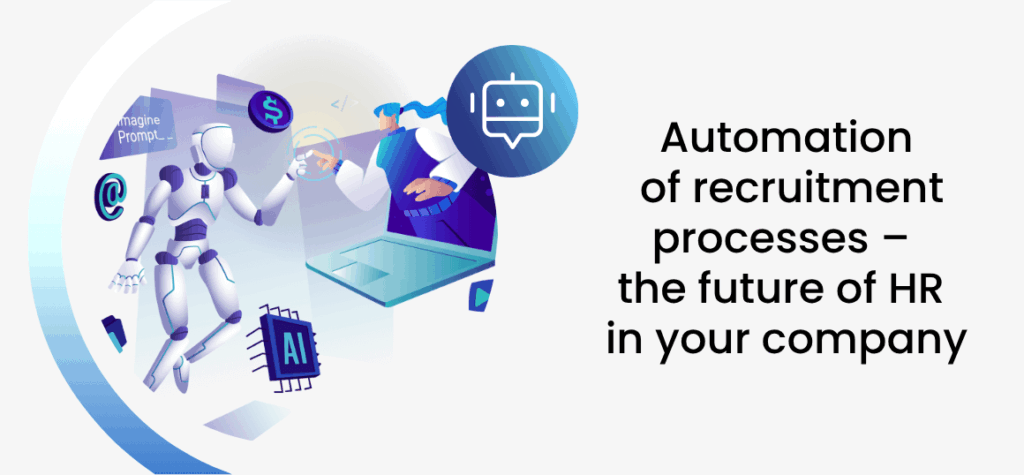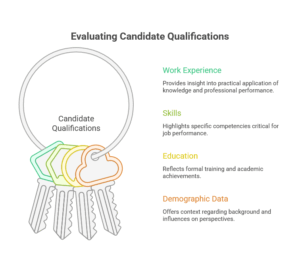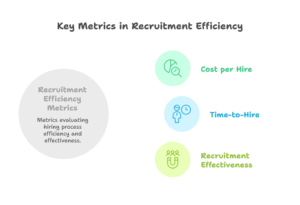Automation of recruitment processes – the future of HR in your company

Automation of recruitment processes – modern HR and AI
In recent years, recruitment processes have evolved significantly — largely thanks to modern tools powered by artificial intelligence. These solutions can effectively shorten the entire recruitment cycle and help identify high-value candidates. In this way, they offer invaluable support to HR managers. See how you can automate the work of recruiters using AI.
The potential of AI tools in recruitment and HR work automation
The potential of artificial intelligence in HR is already enormous — and it continues to grow every year. AI tools are particularly powerful in analyzing large volumes of data in real time, far surpassing human capabilities in this regard. This is especially helpful in recruitment processes involving a high number of applications. Efficiently managing document analysis and the recruitment process itself requires time, expertise, and the right approach. That’s where AI steps in. Artificial intelligence is already revolutionizing the job market — and this seems to be only the beginning. Below are some key areas where AI is proving valuable in automating the work of HR professionals.
Automating the processing of thousands of CVs – saving time and more
Recruitment often involves reviewing a large number of applications. Manually going through all received CVs can be a major burden on HR teams and sometimes even impossible. This is made more difficult by the fact that many CVs don’t meet basic requirements and are eliminated in the initial screening stage. Instead, AI tools can be used to automatically verify whether received documents meet the specified criteria. They filter out unqualified applications before they ever reach a recruiter — significantly reducing both time and cost.
Recruitment specialists no longer need to sift through piles of documents. AI tools can thoroughly analyze them and extract key information about candidates, including their:
- work experience,
- skills,
- education,
- demographic data.

On this basis, they generate structured reports that are easy to review, reducing the risk of poor hiring decisions and the costs associated with them. Some AI-based tools can even match candidates based on selected keywords and semantic data. One noteworthy example is the Applicant Tracking System (ATS) — a tool designed to scan and compare keywords found in candidate CVs, helping to identify the best matches quickly and efficiently.
Recruitment chatbots as HR assistants
Another example of AI support in HR is the recruitment chatbot. This tool can handle the initial stage of the recruitment process on behalf of a human recruiter. It is capable of conducting preliminary interviews with candidates, assessing their motivation to take up employment, and answering basic questions. But that’s not all — based on the data it collects, the chatbot can match candidates to specific job roles and compare compatibility levels among different applicants. In doing so, it assists HR professionals in their daily tasks and reduces the time required to decide whether to proceed with or reject a candidate.
Why implement a chatbot as an HR assistant? Most notably, this tool can manage multiple recruitment processes simultaneously. It also works 24/7, allowing it to continuously collect and evaluate applications, as well as conduct interviews on behalf of recruiters. Additionally, it provides detailed reporting for human review.
Recruitment voicebots
It’s also worth considering recruitment voicebots. These voice assistants can conduct real-time conversations with multiple candidates. These tools are used to analyze candidate qualifications and evaluate their fit for specific job positions. Voicebots are already being implemented in areas such as:
Porozmawiaj z naszym specjalistą
- candidate application screening,
- candidate experience analysis.
These tools are powered by speech recognition modules and natural language processing (NLP). Machine learning algorithms play a critical role as well, allowing the voicebot to improve with every interaction and better align with recruitment goals over time. It is estimated that implementing a voicebot in recruitment can save up to 80% of a recruiter’s time and accelerate the hiring of a well-matched candidate by approximately 30%. That’s why it’s worth learning how to leverage AI-powered voicebots in recruitment conversations effectively.
Analyzing body language and voice tone during video interviews
Artificial intelligence is also useful during video interviews. There’s a growing trend of using platforms that analyze candidates in real time, focusing on:
- body language,
- spoken words,
- tone of voice.
These tools help assess candidate tension, stress resistance, and even the sincerity of their intentions. However, it’s important to note that AI tools don’t guarantee 100% accuracy — they should serve as a supporting tool, not a final decision-maker in recruitment. One example of such a platform is HireVue, which is already being used in various HR departments worldwide.
AI tools in optimizing recruiters’ work
From the perspective of an employer or business owner, AI tools can also be used to optimize recruitment-related costs. These solutions are capable of collecting detailed data, including:
- cost per hire,
- time-to-hire,
- recruitment effectiveness.

Based on this information, HR KPIs can be calculated. This helps identify areas where mistakes are most often made — and eliminate them. The goal is to reduce the cost of acquiring a new employee as much as possible. That cost depends not only on hiring the right person, but also on how long the employee stays with the organization. AI-powered solutions can even help predict candidate loyalty early in the recruitment process.
We are witnessing a revolution in HR
Over the past decade, we’ve seen a real transformation in the HR landscape. The automation of recruitment processes using AI has become standard in large organizations. Increasingly, small and medium-sized businesses are also adopting AI tools in recruitment. One of the pioneers was L’Oréal, which implemented its first recruitment chatbot in 2017. It had basic features that already helped shorten the hiring process. Since then, a lot has changed. In less than ten years, AI has become widely used in HR, with recruitment agencies also benefiting from it. We’ve already mentioned chatbots, voicebots, and platforms for analyzing body language and voice tone. But in the HR field, it’s also worth noting the role of AI in recruitment marketing, especially in designing strategies and advertising campaigns. The full potential of artificial intelligence in recruitment is likely yet to be discovered, and in the coming years, we can expect new developments and innovations.
At EasyCall, we offer customized recruitment voicebots tailored to each client’s specific hiring process. Our solutions are designed for efficiency and built to deliver measurable results. Our experts are here to support you throughout the implementation process. Want to learn more? Feel free to contact us directly — we’ll be happy to help.
